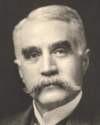 (source)
(source)
|
Charles Francis Brush
(17 Mar 1849 - 15 Jun 1929)
American inventor and industrialist.
|
A Town Lighted by Electricity.
from Cleveland Herald (1880)
WABASH, Ind., March 31.—As the clock struck 8 four Brush lamps of 8,000-candle power each put forth a noonday light for one mile in circumference. The lamps, suspended midway of the iron flagstaff on the Court-house, which towers 100 feet above the business part of the town, were furnished with electricity by a No.5 generator, driven by a 7-horse power engine. According to contract, the light was to equal a gas-burner 2,640 feet from the light. The Council placed men at different parts of the city to observe, and they reported satisfactorily. At Urbana, five miles north, the light was said to be beautiful. The test has given general satisfaction. Excursion trains on the Cincinnati, Wabash and Michigan had brought in hundreds from Marion and southern points, while the northern section, including Elkhart, was largely represented. Fully 10,000 people arrived by 7 o'clock, among whom were the Councils of 19 adjacent towns and the Mayors of Marion and North, who came in the interest of their people, and they declared the light to be beyond their expectations. Mr. F. C. Phillips, electrician, who superintended the construction of the apparatus, had grave doubts about the temporary engine being equal to the task, but it answered the purpose. Many who came expecting to see the lamps distributed in various parts of the town were disappointed; otherwise their expectations were realized. It may be three or four weeks before Wabash will be permanently lighted up, as it will require that time to get a stationary engine in place and the necessary arrangements completed, but, according to the report of the Council, steps will be taken to put everything in shape for its immediate use.
- 17 Mar - short biography, births, deaths and events on date of Brush's birth.
- Progress of the Brush System, article from Scientific American (1881) on industry's adoption of Brush lighting.
- 31 Mar - births, deaths and events on date Wabash, Indiana, became first U.S. city lighted by electricity.
- Electrifying America: Social Meanings of a New Technology, 1880-1940, by David E. Nye. - book suggestion.




